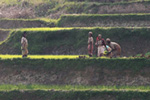Food prices in February hit a new record, breaking the previous one set in January and continuing an eight-month streak of rising prices, according to the Food and Agriculture Organization (FAO). Experts fear that rising food prices could lead to another food crisis similar to that of 2007-2008.
The FAO’s Food Index Price averaged 236 points last month up 2.2% from January and the highest recorded in the Food Index Price’s 21 years. The only commodity that didn’t rise was sugar.
The FAO adds that rising oil prices could push food prices even higher.
“Unexpected oil price spikes could further exacerbate an already precarious situation in food markets,” David Hallam, Director of FAO’s Trade and Market Division, said in a press release. “This adds even more uncertainty concerning the price outlook just as plantings for crops in some of the major growing regions are about to start.”
Given the complexity of world markets and agriculture, experts have pointed to a number of reasons behind the current food price rise including higher meat, dairy, and egg consumption, the commodity boom, fresh water scarcity, soil erosion, biofuels, growing human population, and climate change linked to extreme weather events such as last year’s heatwave in Russia.
Currently, the UN estimates that one billion people in the world are going hungry, nearly 14% of the world’s population.
Related articles
Food crisis 2011?: drought in China could push food prices even higher
(02/09/2011) The UN’s Food and Agriculture Organization (FAO) has warned that a drought in China could devastate the nation’s winter wheat crop and further inflate food prices worldwide. Already, food prices hit a record high in January according to the FAO. Rising 3.4 percent since December, prices reached the highest point since tracking began in 1990. While many fear a food crisis similar to the one in 2008-2007, experts say the world has more food in reserve this time around and gasoline, at least for now, remains cheaper. However, if China loses its winter wheat that could scuttle any hopes of avoiding another price rise in crop staples.
Numerous causes, including climate change, behind record food prices
(02/07/2011) Food prices hit a record high in January according to the UN’s Food and Agriculture Organization (FAO), threatening the world’s poor. Rising 3.4% since December, the FAO stated that prices reached the highest point since the agency began tracking food prices in 1990. Given the complexity of world markets and agriculture, experts have pointed to a number of reasons behind the rise including rising meat and dairy consumption, the commodity boom, fresh water scarcity, soil erosion, biofuels, growing human population, and a warming world that has exacerbated extreme weather events like last year’s heatwave in Russia.
‘Land grab’ fears in Africa legitimate

(01/31/2011) A new report by the International Institute for Environment and Development (IIED) has found that recent large-scale land deals in Africa are likely to provide scant benefit to some of the world’s poorest and most famine-prone nations and will probably create new social and environmental problems. Analyzing 12 recent land leasing contracts investigators found a number of concerns, including contracts that are only a few pages long, exclusion of local people, and in one case actually give land away for free. Many of the contracts last for 100 years, threatening to separate local communities from the land they live on. “Most contracts for large-scale land deals in Africa are negotiated in secret,” explains report author Lorenzo Cotula in a press release. “Only rarely do local landholders have a say in those negotiations and few contracts are publicly available after they have been signed.”